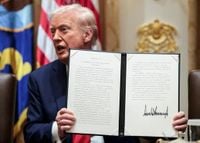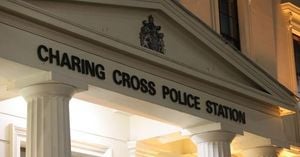In Alaska, the second Monday of October will pass with little official fanfare—at least when it comes to Columbus Day. That’s been the case since 2015, when then-Governor Bill Walker signed a declaration swapping the historic holiday for Indigenous Peoples Day. Two years later, Walker made the change permanent by signing it into law, reflecting a broader movement across the United States to reconsider which histories and heroes are celebrated each autumn.
Yet, while Alaska marks Indigenous Peoples Day, most of the country will still observe Columbus Day on October 13, 2025. The federal holiday, first established in 1892, remains one of the nation’s ten official holidays, and this year it’s taken on renewed political significance. On October 9, President Donald Trump issued a proclamation that forcefully reasserted Christopher Columbus’s place in American lore and sharply criticized efforts to, in his words, "erase our history, slander our heroes, and attack our heritage," according to USA Today.
Trump’s proclamation, signed just days before the holiday, describes Columbus as “the original American hero, a giant of Western civilization, and one of the most gallant and visionary men to ever walk the face of the earth.” The president’s words echoed a familiar refrain: “Outrageously, in recent years, Christopher Columbus has been a prime target of a vicious and merciless campaign to erase our history, slander our heroes, and attack our heritage.” He placed the blame for these attacks squarely on “left-wing radicals,” asserting that, “Under my leadership, those days are finally over — and our Nation will now abide by a simple truth: Christopher Columbus was a true American hero, and every citizen is eternally indebted to his relentless determination.”
Trump’s stance on Columbus Day is part of a wider campaign against what he and his supporters describe as “woke” policies and historical revisionism. In the months leading up to the holiday, his administration launched a review of the Smithsonian Institution—one of America’s most prominent keepers of national memory. The stated goal: to “remove divisive or partisan narratives” and “celebrate American exceptionalism.” The review followed an executive order Trump signed in March, titled “restoring truth and sanity to American history.” That move drew criticism from some historians, who questioned whether it would allow for a balanced and accurate telling of the past, as reported by USA Today.
At the heart of this debate is a centuries-old figure whose legacy has become deeply contentious. Born in Genoa, Italy in 1451, Columbus set sail westward from Spain on August 3, 1492, after years of lobbying the Spanish Crown for support. Commanding the Niña, Pinta, and Santa Maria, he aimed to find a new route to Asia, but instead landed in the modern-day Bahamas on October 12, 1492. Columbus’s arrival marked the beginning of centuries of European exploration and colonization in the Americas—a process that brought profound change, both positive and negative, to the continents and their peoples.
For many Italian Americans, Columbus remains a symbol of pride and accomplishment. Trump, in his October 9 remarks, made sure to acknowledge their contributions: “As we celebrate his legacy, we also acknowledge the contributions of the countless Italian-Americans who, like him, have endlessly contributed to our culture and our way of life. To this day, the United States and Italy share a special bond rooted in the timeless values of faith, family, and freedom.” He added, “Columbus Day we’re back, Italians. We love the Italians.”
But for others, especially Indigenous communities, Columbus’s arrival is inseparable from the exploitation, displacement, and violence that followed. Former President Joe Biden, in his 2021 proclamation, became the first U.S. president to formally recognize both Columbus Day and Indigenous Peoples Day. Biden’s statement acknowledged "the painful history of wrongs and atrocities that many European explorers inflicted on Tribal Nations and Indigenous communities." He argued, "It is a measure of our greatness as a Nation that we do not seek to bury these shameful episodes of our past — that we face them honestly, we bring them to the light, and we do all we can to address them." At the same time, Biden called for reflection on the “courage and contributions of Italian Americans throughout the generations.”
This dual recognition reflects a growing trend in states and cities across the country. Some have chosen to replace Columbus Day with Indigenous Peoples Day, while others, like Alaska, have done away with Columbus Day altogether. Still, many Americans continue to observe the holiday, and for them, the narrative remains one of exploration, faith, and the forging of a new world.
Trump’s 2025 proclamation takes a clear stand in this ongoing debate. He describes Columbus’s 1492 voyage as a “noble mission: to discover a new trade route to Asia, bring glory to Spain, and spread the Gospel of Jesus Christ to distant lands.” Trump’s retelling highlights Columbus’s steadfast prayer and determination, crediting him with “carrying thousands of years of wisdom, philosophy, reason, and culture across the Atlantic into the Americas — paving the way for the ultimate triumph of Western civilization less than three centuries later on July 4, 1776.”
The president’s language is pointed, even combative, as he addresses recent years’ waves of statue removals and monument vandalism: “Before our very eyes, left-wing radicals toppled his statues, vandalized his monuments, tarnished his character, and sought to exile him from our public spaces.” He insists, “As we celebrate his legacy, we also acknowledge the contributions of the countless Italian-Americans who, like him, have endlessly contributed to our culture and our way of life.”
In Alaska, the absence of Columbus Day is a testament to how much the national conversation has shifted. The state’s move to Indigenous Peoples Day, first by gubernatorial proclamation in 2015 and then by law in 2017, was part of a broader reckoning with America’s colonial past. But elsewhere, the debate is far from settled. Trump’s proclamation calls on Americans to “observe this day with appropriate ceremonies and activities” and directs that the U.S. flag be displayed on all public buildings in honor of Columbus and all who have contributed to building the nation.
For Trump and his supporters, the stakes are high. The president frames the defense of Columbus as part of a larger battle for the nation’s soul—a fight against what he sees as a campaign to “destroy” American heritage. In an April social media post, Trump railed against Democrats, claiming they “tore down his Statues, and put up nothing but 'WOKE,' or even worse, nothing at all!”
For critics, including many Indigenous advocates and historians, the focus remains on truth-telling and reconciliation. They argue that reckoning with the darker chapters of history is essential for building a more just and inclusive future. As Biden put it in his 2021 proclamation, “we face [these episodes] honestly, we bring them to the light, and we do all we can to address them.”
October 13, 2025, will mark another chapter in this ongoing debate. Whether Americans gather to celebrate Columbus, honor Indigenous peoples, or simply enjoy a day off, the questions raised by the holiday—about history, identity, and who gets to be called a hero—aren’t likely to fade any time soon.




